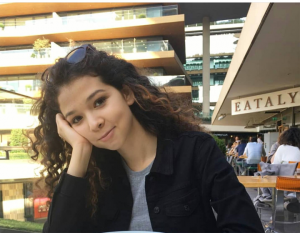
BY ŞEBNEM TÜRE (PSYC/II) sebnem.ture@ug.bilkent.edu.tr
Autumn is a special season for film lovers. As you’re reading these words, Filmekimi, one of the main cinematographic events in Turkey, is probably its last days in Ankara; also, less than a month has passed since the !f İstanbul International Independent Film Festival, another major festival that focuses on new perspectives and independent productions. Every autumn many film festivals take place in the world, in Turkey and even in Ankara, but Filmekimi and !F İstanbul in particular are special festivals for me. For the first time in my life, I got interested enough to attend festivals and look into what actually constitutes a “festival film.”
Film Festivals: A Quick History
In 1935, the Venice International Film Festival started it all. The festival was a part of that year’s Venice Biennale, held under the aegis of the Italian fascist government. Mussolini used the festival as a tool of fascist propaganda, and politics took over cinematography. This actually had a positive consequence, though – the fascist undertones of the Venice festival provoked a reaction and led to the establishment of another film festival: Cannes.
During the ’30s, only three film festivals existed: Venice, Cannes, and also the Moscow International Film Festival. In subsequent years, Europe continued to be the leader in holding such events, in reaction to Hollywood’s more commercial films; festival-type films were associated with Europe until the arrival of festivals such as Sundance, Toronto, Telluride, Montreal and Hong Kong, held on other continents.
In the late ’80s and the ’90s, thanks to productions such as Steven Soderbergh’s “Sex, Lies, and Videotape” and Quentin Tarantino’s “Pulp Fiction,” the film industry saw that festival films could also be profitable. This increased the industry’s interest in film festivals, and so here we are today with many festivals operating all around the world.
What’s the Situation in Turkey?
A lot has happened since the summer of 1982, when the first İstanbul International Film Festival took place. With festivals in İstanbul, Ankara, İzmir and even in smaller cities, the impact of these events is highly positive today, given that festivals in Turkey help filmmakers find financial support such as that provided by Eurimages and similar funds. Moreover, when administered properly, government ministry programs – for example, one providing funding to directors who have made their first film – do indeed support young directors and help raise Turkey’s profile at international festivals.
Critics say that what is important for Turkish cinema today is not the number of festivals, but their continuity. Unfortunately, every year we witness festivals being canceled or postponed. In 2016 alone, a study revealed, the Edirne, Malatya and Mardin festivals were canceled, and some municipalities, especially in the eastern part of the country, did not allow events to operate. Here we can do two things. First, to eliminate the effects of politics, more cooperation with the private sector and nongovernmental organizations should take place. Second, we should oppose the viewpoint that sees a film festival only as a way to promote a city, with no concern for artistic merit, resulting in short-lived festivals run by incompetent organizational teams. Let’s hope this will not be the case for Urfa’s Göbeklitepe International Film Festival this year.
Some (and Only Some) of the Festivals You Might Want to Take a Look At
Bosphorus Film Festival: Another fall festival, opening on October 18 this year and running through the 25th, it will showcase 83 films from 25 countries, including a very special opening film: the closing film of the 72nd Cannes Film Festival, “The Specials.”
Sinemasal Film Festival: This is a social project as well as a film festival, also active in Peru, South Africa and the Philippines. It gives underprivileged children, who may never have seen a single film, the experience of going to the cinema. This year the festival took place September 16–27, traveling through Ardahan, Kars, Iğdır, Ağrı, Van and Hakkari; the organization accepts donations, including sponsorship of gift tickets.
Filmekimi (Film October): Filmekimi has been going on for 17 years and draws capacity crowds. This festival screens the best films of the year, including award winners from the Cannes, Venice and Berlin festivals, often as the films’ premieres in Turkey. After opening earlier this month in İstanbul, the program is continuing in Ankara through October 16; the festival’s concluding run will take place in the Aegean province of İzmir, October 19–23.
Başka Sinema (“Every Day’s a Festival for Us”): By screening examples of art cinema in theaters at various times during the year, Başka Sinema has become a meeting point for film lovers across Turkey. Five years after its establishment, the organization decided to hold its own film festival, which took place this October 4–9 in Ayvalık.
Ankara Accessible Film Festival: Based on the idea that every individual has a right to participate in cultural life, the Ankara Accessible Film Festival selects contemporary movies and presents them with audio description for the visually impaired, and sign language with detailed subtitles for the hearing impaired. This year’s festival was held September 26–29 in İstanbul, Eskişehir and Ankara.
Outside the metropolis: The festival season will continue in November with the Eskişehir International Film Festival, which moved from May/June to November this year, and the Malatya International Film Festival. The Festival on Wheels will be moving from city to city between November 29 and December 13.
Outside the autumn festival season: And in case you miss the season, the Rendezvous İstanbul International Film Festival in December, and in April, the Ankara International Film Festival and the İstanbul Film Festival, which was first presented as a film week in the summer of 1982, are options to look forward to.
